The 30 Healthiest Foods To Eat Every Day
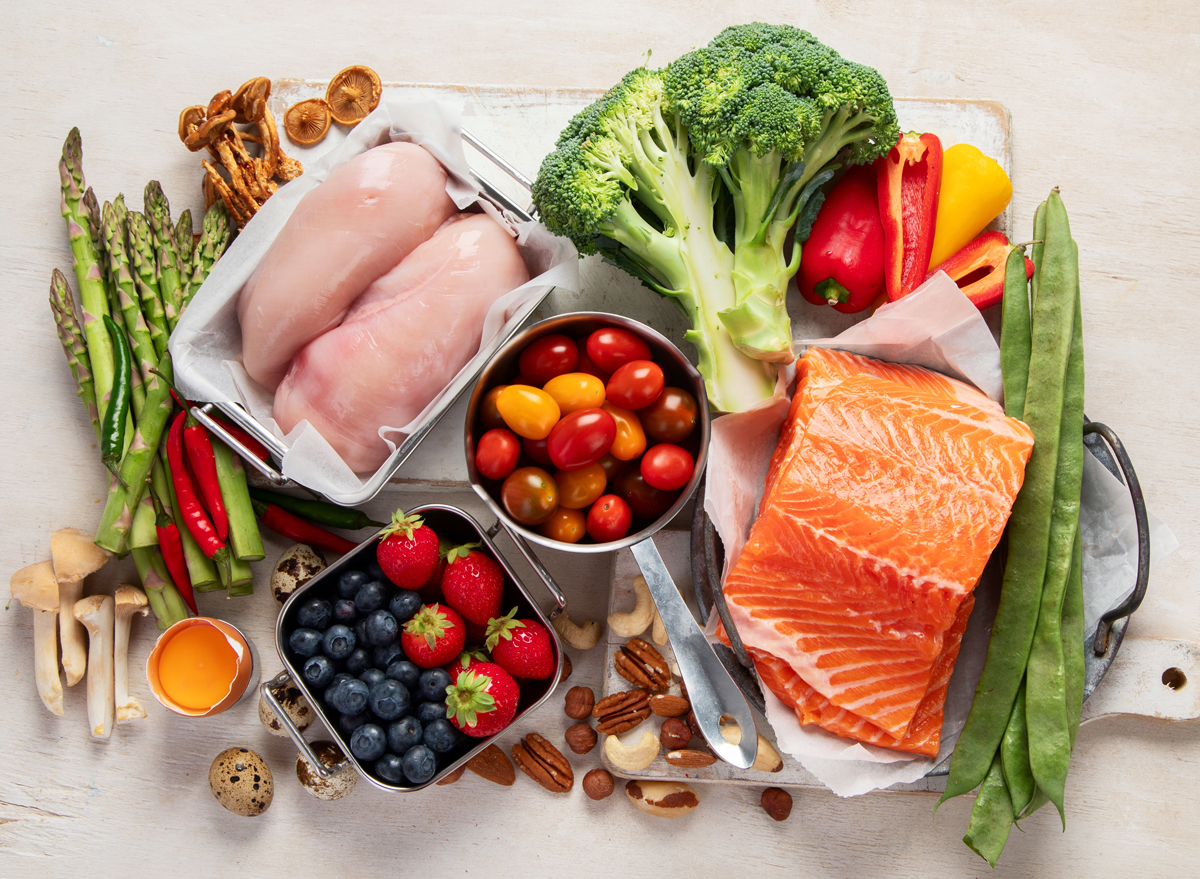
Eating a healthy diet is one of the most important steps you can take to live your best life. While factors like quality sleep, stress levels, and physical activity all play a role in overall health, the foods you choose daily have a significant impact on both your physical and mental well-being. Instead of relying on fad diets that restrict your favorite foods, achieving a truly healthful diet is about adding nutrient-dense, healthy foods to your routine.
One common misconception about eating healthy foods is that it has to be expensive. While wellness culture often promotes pricey “superfoods,” the truth is that many of the healthiest foods, such as poultry, fruits, grains, vegetables, and legumes, are affordable and accessible. These everyday staples are packed with nutrients to fuel your body and support long-term health without breaking the bank.
To help you make smarter food choices, we’ve curated a dietitian-approved list of the 30 healthiest foods to eat every day. These nutrient-packed options are easy to incorporate into your meals, helping you build a sustainable, balanced diet. Keep reading to discover how these healthy foods can transform your routine—and for more tips, check out 7 Foods That Can Help You Live Longer.
Walnuts
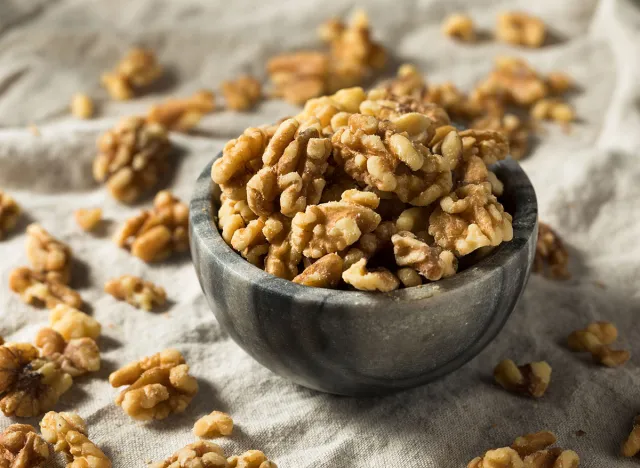
If you’re in need of a healthy snack, you may want to reach for a handful of walnuts. “Walnuts are rich in healthy fats, fiber, vitamins, and minerals, and eating them can help lower LDL cholesterol (bad cholesterol) and help to reduce the risk of heart disease,” says Lisa Young, PhD, RDN, author of Finally Full, Finally Slim. “They also contain fiber and probiotic compounds, which help improve gut health, and its protein content increases satiety that is essential for weight management.”
Lauren Manaker, MS, RDN registered dietitian and author of The First Time Mom’s Pregnancy Cookbook and Fueling Male Fertility adds that walnuts are a rich source of ALA omega-3 fatty acids, which are a type of healthy fat found in certain plant sources, and multiple research studies have proven their potential health benefits. “One study published in Nutrients found that adding one ounce of walnuts (or one handful) to the diet of children and adults who do not normally eat nuts improved the overall diet quality and intake of under-consumed nutrients like fiber, potassium, and magnesium,” says Manaker. “These new findings carry forward previous results that suggest walnuts may act as a bridge to better well-being.”
Oatmeal
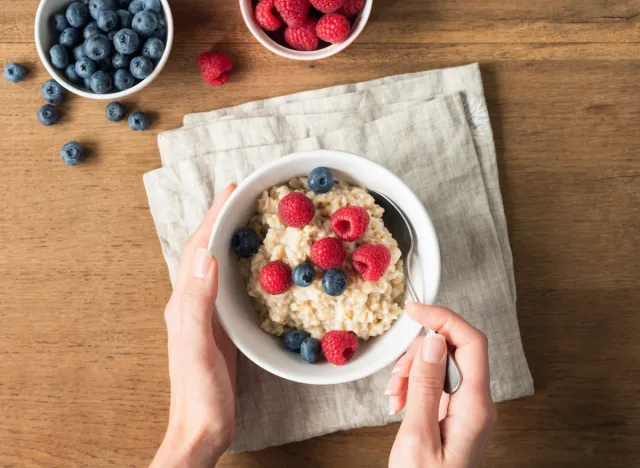
Did you know that your sweet and creamy bowl of morning oatmeal is actually providing you with multiple amazing health benefits? That’s because oats themselves are full of nutrients like fiber, manganese, copper, zinc, and vitamin B, as well as powerful antioxidants like avenanthramides.
Due to their nutrient density, oats can help lower cholesterol, manage blood sugar, aid in digestion, and can help keep you full after eating.
Unfortunately, even though oatmeal can provide an assortment of health benefits, certain types of store-bought oatmeal packets come loaded with sugar and may cancel out some of its positive effects. To help keep your oats as healthy as possible, make a bowl of plain steel-cut oats and then add in your desired toppings like fruit, chia seeds, and honey.
Peanut Butter
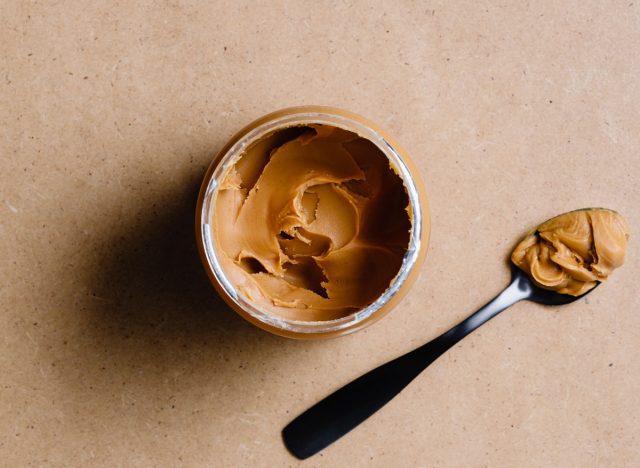
Similar to yogurt, natural peanut butter is a healthy snack that can provide your body with a handful of benefits. Just make sure you’re avoiding the brands that pack in added sugars and other oils.
“Eating peanut butter in moderation brings benefits to your overall health, such as a boost of protein and healthy fats, which can help control blood sugar levels and reduce the risk of diabetes,” says Young. “Consumption of peanut butter can help lower LDL cholesterol and reduce inflammation, while the vitamin E present is essential for brain health.”
Blueberries
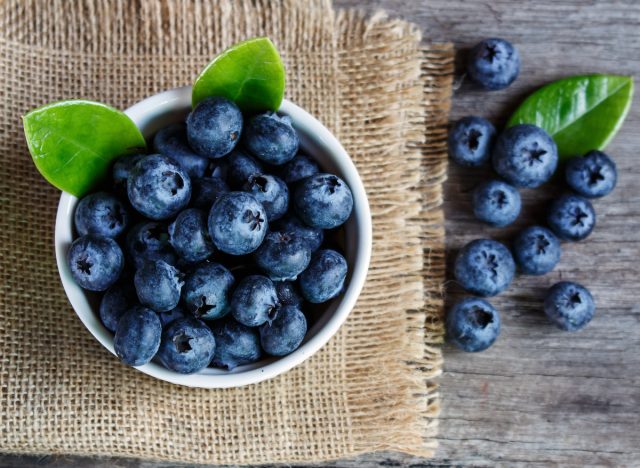
Whether you top your yogurt off with this fruit, throw them in a smoothie, or just grab a handful to snack on them as is, blueberries are considered to be one of the healthiest foods out there.
“Blueberries are rich in vitamins, minerals, and antioxidants, and their high antioxidant levels can improve brain function, help lower inflammation in the body, and even contribute to lowering the risk of heart disease,” says Young.
And if you needed even more of a reason to add these berries to your daily diet, know that they are “also high in fiber, which helps improve digestive health and prevent constipation,” says Young.
Yogurt

Yogurt, at its core, is one of the healthiest foods you can eat. Of course, it depends on the type you’re eating and whether or not you’re buying super sugary varieties. But as is, “Yogurt contains probiotics that can help promote immune health and enhance the gut microbiota,” says Young.
Along with being rich in probiotics, most yogurts are also “a good source of calcium, phosphorus, and vitamin D, all of which play a role in bone health,” Young adds. “And on top of that, the protein content in yogurt is also essential for building and repairing tissues in the body.”
Broccoli
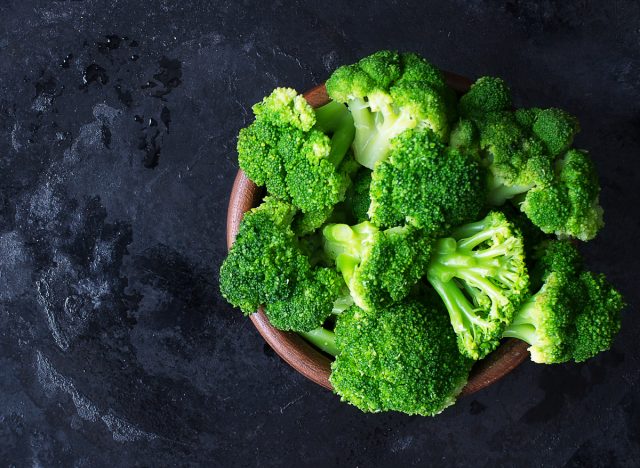
One of the healthiest vegetables you can eat is broccoli, a cruciferous veggie in the same family as cauliflower, Brussels sprouts, kale, and cabbage.
“Broccoli is rich in vitamins, minerals, and antioxidants, which overall can promote digestive benefits, immune system function, and bone health,” says Young. “For instance, broccoli contains vitamin C and is high in fiber,” and some research has found that it (as well as other cruciferous vegetables) may help to lower risk of heart disease.
Salmon
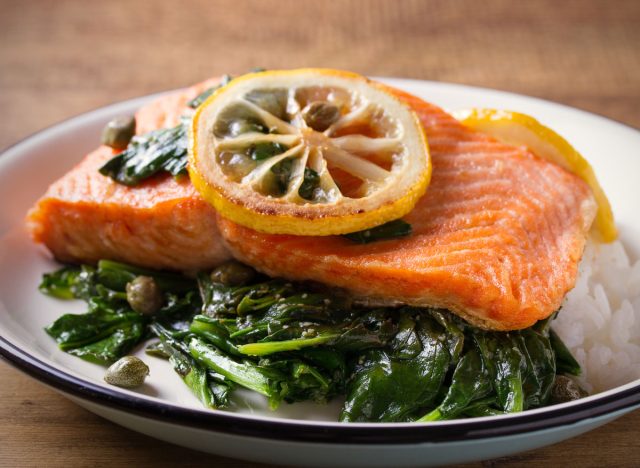
Fish of any variety can contribute healthy fats and protein to your diet, but salmon is one of the healthiest kinds you can eat. “Salmon is a good source of protein and omega-3 fatty acids, and the protein content in salmon is essential for building and repairing muscle while enhancing immune function,” says Young. “The omega-3 fatty acids in salmon also play a role in brain health and reducing the risk of neurological disorders.”
Young encourages people to eat salmon as part of a healthy diet, because “Overall, consuming this fish can improve brain function, heart health, and reduce the risk of certain diseases.”
Olive Oil
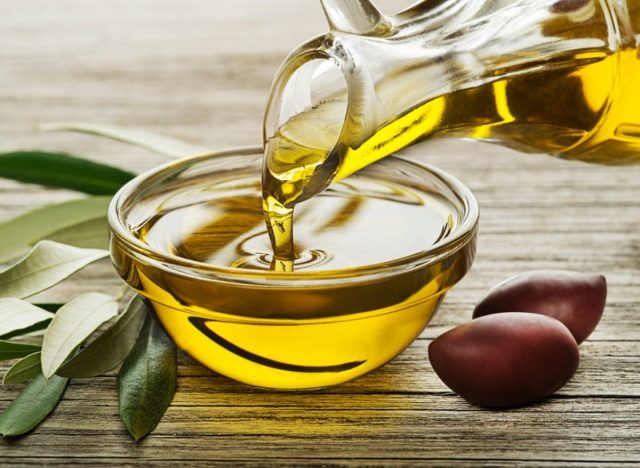
When you’re in need of a cooking oil, you may want to reach for olive oil. Studies have shown that this food is rich in antioxidants that can help fight oxidative stress damage, reduce your risk of chronic diseases, fight inflammation, lower cholesterol, manage blood pressure, and improve the function of your brain.
In fact, olive oil is one of the main components of the Mediterranean Diet, which many studies have concluded is one of the healthiest eating patterns when it comes to improving the health of your heart and reducing your risk of disease.
Eggs
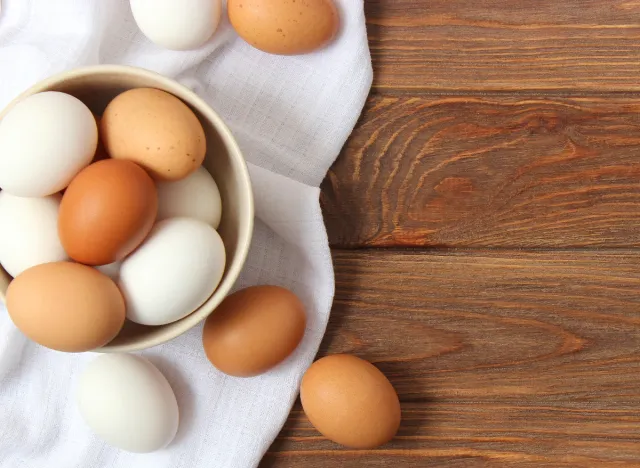
You may have felt in the past that you need to avoid eggs because of their cholesterol levels, but this simply isn’t true! “Eggs can be included as part of a heart-healthy diet for healthy adults, and according to the American Heart Association (AHA), ‘healthy individuals can include up to a whole egg or equivalent daily’ as part of a heart-healthy dietary pattern,” says Manaker.
But what makes eggs so healthy? For one, they are high in protein at around 6 grams per egg. Not only that but “Eggs are one of the best sources of choline—a nutrient that supports brain health,” says Manaker. She adds, “Unfortunately, most Americans are not consuming nearly enough choline, so including an egg in a diet (with the yolk) can help bridge that gap.”
Chicken
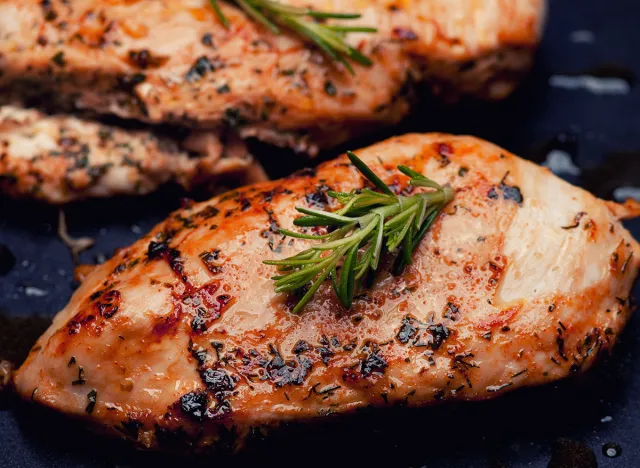
Chicken is a healthy, lean, protein-packed meat option. In just half a chicken breast, you’ll be giving your body about 26 grams of protein and only 3 grams of fat.
Along with being a lean protein source, chicken also contains a significant portion of your daily value for selenium, niacin, and vitamins B6 and B12. Selenium is linked to your immune health, nail, and skin health, and the functioning of your thyroid. Niacin (also known as vitamin B3), is known for helping with the health of your nervous system and your digestive tract, and vitamins B6 and B12 have been found to have a significant impact on the health of your brain.
Almonds
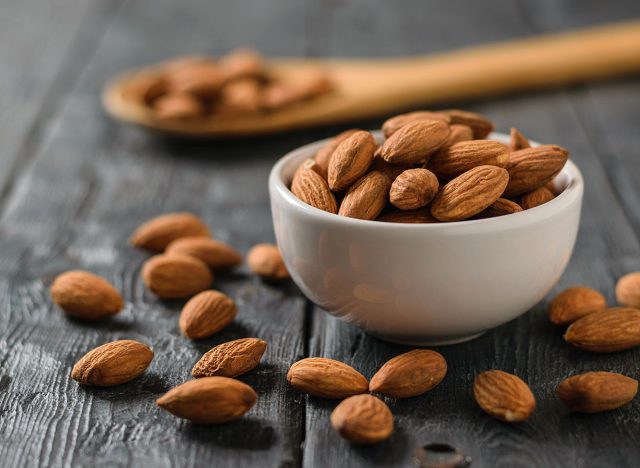
We’ve already included pistachios and walnuts on our list of healthy foods, but why not incorporate some almonds into your daily diet as well?
Many people snack on almonds without even realizing that they’re gifting their body with the nutrients it needs every day. For instance, in a 1/2 cup of almonds, you’ll get about 15 grams of protein, 9 grams of fiber, and a huge boost of calcium, magnesium, and potassium.
And if you want the most out of your almond snack, make sure to still eat the skin, as a study from Comprehensive Reviews in Food Science and Food Safety found that many of the antioxidants in almonds are located in the highest concentrations in its skin. If you’re not into snacking on plain almonds, you can always keep the antioxidant-rich skin and make your own natural almond butter by blending the almonds in a food processor.
Tomatoes
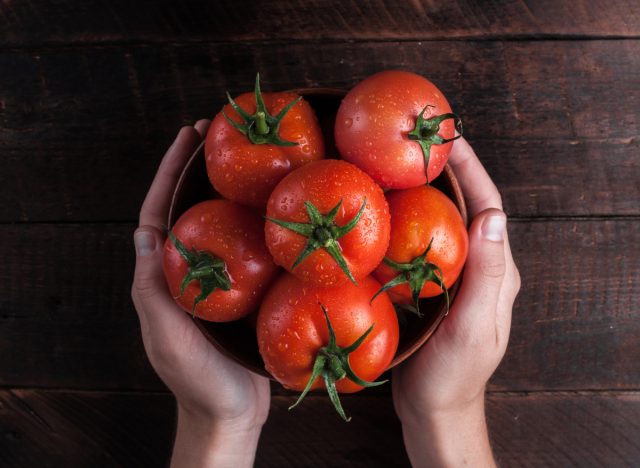
Tomatoes are often loved for their versatility and ability to transform into a delicious pasta sauce, spicy salsa, or pizza topping. But what many people don’t realize is that this bright red food is one of the healthiest items you can incorporate into your daily life.
There is much to be found inside a tomato, such as fiber, choline, vitamin A, vitamin C, potassium, and calcium, but many of its health benefits can be traced back to the compound that gives it its vibrant red coloring: lycopene.
Lycopene—which is also found in watermelon, red peppers, grapefruit, and papaya—is a powerful antioxidant that has been linked to lower cholesterol, reduced blood pressure, and even a reduced risk of prostate cancer.
Avocado
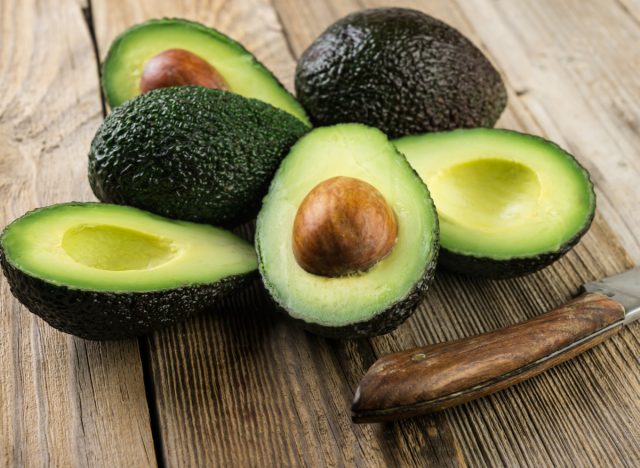
When you look at the list of health benefits and nutrients associated with avocados, you’ll see that this fruit is nothing short of a miracle food.
In just one avocado, you’re getting 14 grams of fiber and 4 grams of protein, plus vitamins C, E, K, B2, B3, and B6, folate, magnesium, and copper. Along with all of these vitamins, minerals, and nutrients, one of the most defining characteristics of avocado is its high levels of healthy fats. In one avocado you’ll get about 30 grams of fat, only 4 of which are saturated and the rest are poly- and mono-unsaturated—the kind that benefits your heart by way of helping to lower cholesterol and reduce your risk of heart disease and stroke.
Carrots
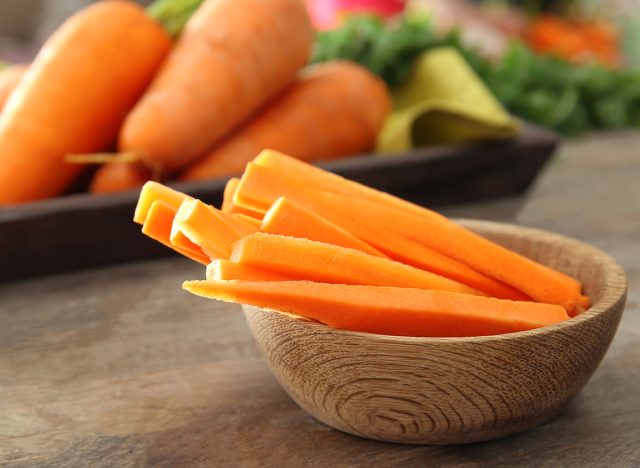
Whether you enjoy eating them raw with a delicious ranch dip or baked in the oven alongside some of your other favorite vegetables, carrots can provide an array of benefits when consumed on a regular basis.
You’ve most likely heard of carrots as being good for your eyes, which still holds true because of an antioxidant called lutein that can be found in large quantities in carrots. But carrots are much more than meets the eye.
This vegetable is rich in a number of antioxidants, as well as biotin, potassium, and vitamins K, A, and B6. Because of their nutrient richness, carrots have been found to help lower cholesterol, as well as increase fullness and reduce calorie intake because of their fiber content.
To top it off, a cup of carrots contains all of these nutrients mentioned while having less than 0.3 grams of fat and only 50 calories.
Pistachios
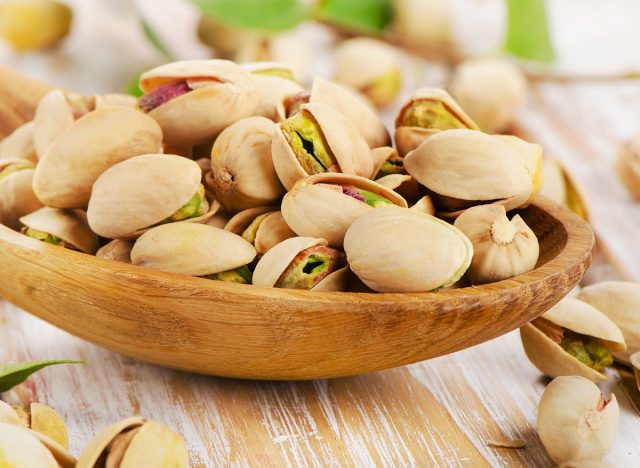
When it comes to healthy snacking, pistachios are your best friend. Not only do they taste delicious and help to ease some of your savory cravings, but they are loaded with helpful antioxidants.
“Pistachios contain potent antioxidants that help to protect the body against harmful free radicals that damage cells, create inflammation, and lead to chronic disease,” say Tammy Lakatos Shames, RDN, CDN, CFT, and Lyssie Lakatos, RDN, CDN, CFT, also known as the Nutrition Twins. So much so that “Recent research out of Cornell found that the antioxidants in pistachios rival other common high antioxidant foods, like blueberries, pomegranates, and red wine.”
The Nutrition Twins add that, “One advantage pistachios have over most other high antioxidant foods is that they are a complete plant-based protein, and in fact, one serving of pistachios has more protein than an egg.”
And the benefits don’t even stop there! “The combination of protein and fiber in pistachios helps to slow digestion to keep you feeling satisfied and helps to cause a gradual rise in blood sugar, preventing energy dips that trigger cravings, as well as making pistachios very satisfying and great for staving off hunger and helping with weight control,” say the Nutrition Twins.
Turkey
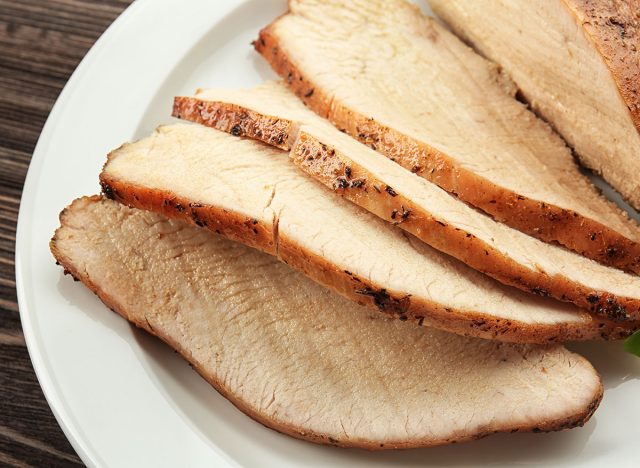
For those who eat meat and want to incorporate it into their daily routine, turkey is the way to go. Turkey is one of the highest-protein meats and contains some of the lowest levels of fat, making it an amazing lean protein source.
For instance, a 3-ounce serving of turkey breast has over 25 grams of protein and less than 2 grams of fat. When compared to another high-protein meat product like pork loin, you’ll see that a 3-ounce serving of pork has less protein (18 grams) and more fat (7 grams).
Ground turkey also makes an amazing replacement for ground beef and can be made into burgers or put into your favorite pasta dishes for less fat and a large protein boost.
Black Beans
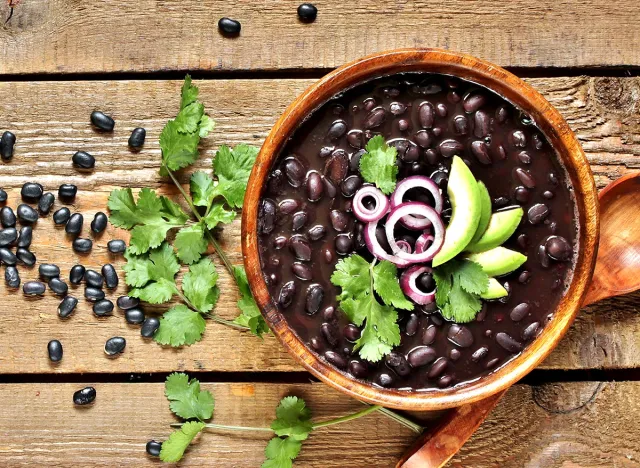
One of the nutrients that Americans simply don’t get enough of is fiber. Unfortunately, not getting enough fiber in your daily diet can impact your digestion, gut microbiome, cholesterol levels, blood sugar, and so much more.
If you’re in need of more fiber throughout the day, one of the richest sources (and also one of the most affordable) is black beans. In just one cup of cooked black beans, you’ll get 15 grams of fiber. According to Harvard Health, women should be aiming for around 25 grams per day and men around 38, so as you can see, just one cup of beans can make an enormous dent in your fiber levels for the day.
One crucial thing to keep in mind, according to Harvard Health, is that when you’re incorporating more fibrous foods into your diet, you’ll want to do so in small doses and not all at once. If you include too many of these in large amounts all at once, it can cause gastrointestinal discomfort like gas and bloating. So, make sure to slowly add black beans to your diet if you’re not used to eating them.
Leafy Greens
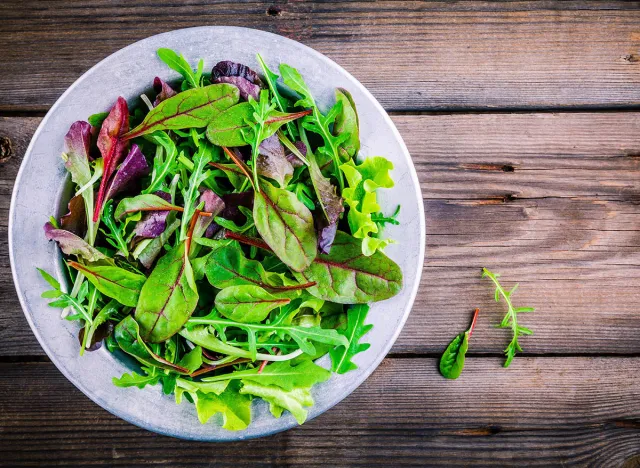
Leafy greens are a group of vegetables including kale, mustard greens, spinach, arugula, Swiss chard, and bok choy, and all of these greens “are incredible nutrient powerhouses, with each type of green having a slightly different nutrition profile,” says Greene. She suggests “Rotating between a few different leafy greens throughout the week to consume a variety of vitamins, minerals, grams of fiber, and antioxidants.”
Let’s look at a few of the more common leafy greens as examples of the benefits you can be gifting your body with. Spinach is high in insoluble fiber, antioxidants, vitamins A and K, calcium, and iron, making it healthy for your eyes, heart, and digestion. Kale is another popular leafy green, which comes packed with calcium, as well as vitamins K, A, and C. Because of these nutrients, this green has been found to support eye health and heart health, among many other health benefits.
Pumpkin Seeds
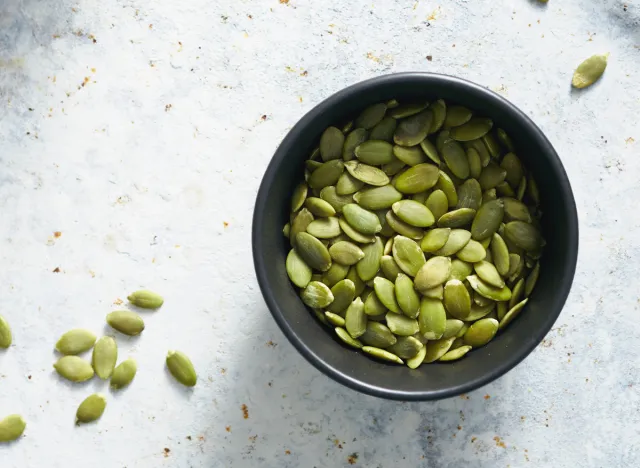
People think of pumpkin and instantly transport their minds to pumpkin spice lattes or their favorite fall baked goods. But pumpkin seeds can be enjoyed as a quick, healthy snack year-round.
“Pumpkin seeds are an amazing source of fiber and magnesium—two nutrients that support digestion,” says Sydney Greene MS, RDN. “Magnesium is not only important for digestion, but it is also important for regulating stress and supporting your mood.” In fact, studies have found that in those experiencing depression or depressive symptoms, their levels of magnesium are often lowered.
To give your digestion and mood a boost, add a handful of pumpkin seeds to your daily routine.
Chia Seeds
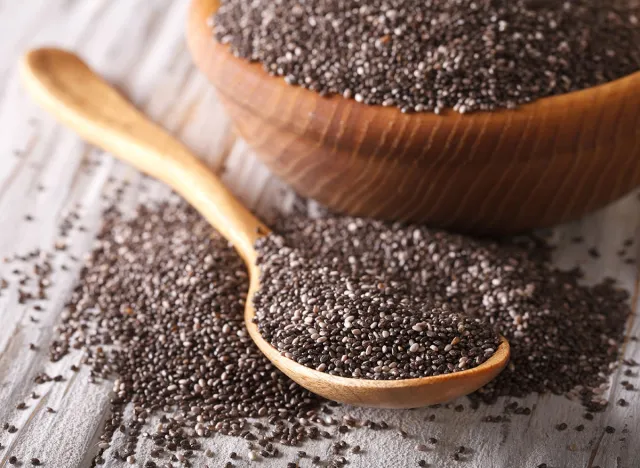
One of the healthiest foods you can find is also one of the smallest. Chia seeds might be small, but they pack a mighty punch of helpful nutrients like fiber, protein, calcium, iron, magnesium, and so much more.
In just one ounce of chia seeds, you’re getting over 4 grams of protein, almost 10 grams of fiber, about 23% of your daily value for magnesium, and 14% of your daily calcium value. What’s even better is that you can enjoy the health benefits of chia seeds without even really noticing they’re there. For instance, you can put a couple of spoonfuls in your water or smoothie, or you can toss some into your overnight oats and let them soften in the refrigerator. They are almost tasteless and become soft when added to liquids, so they’re the perfect way to sneak nutrients into your already-established routine.
Cacao
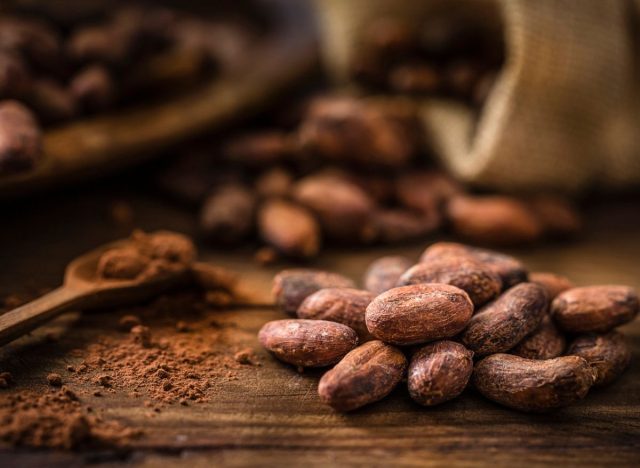
Healthy food can be delicious, especially when it comes to cacao—the source of your favorite chocolate treats.
Raw cacao beans are the seeds that come from cacao trees, and these beans are the foundation for making chocolate. When these beans are processed and turned into a powder, you get cocoa powder.
Cacao beans are chock full of flavanols, which are plant compounds known to have powerful health benefits. In fact, cocoa has been found to help manage blood pressure, lower blood cholesterol, and even help reduce the risk of heart disease and stroke.
However, not all chocolate is created equal. To maximize the health benefits, choose chocolate with a higher cacao percentage, as it typically contains less added sugar and other ingredients.
Broccoli Sprouts
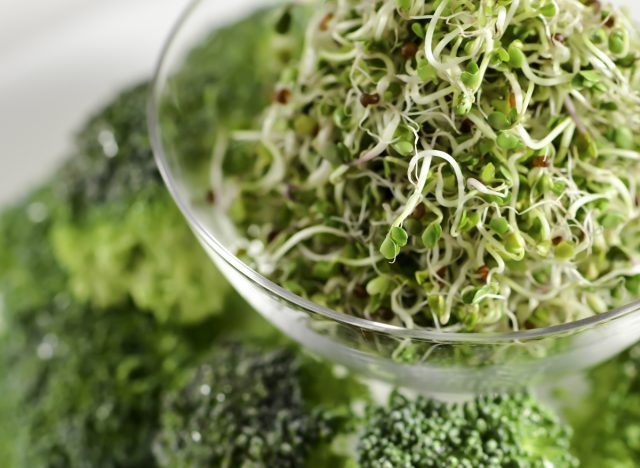
Broccoli is well-known for its impressive nutrient profile, but don’t overlook broccoli sprouts—the germinated seeds of broccoli harvested when they’re just 3–5 days old.
According to the Nutrition Twins, these sprouts “are one of the top anti-cancer and anti-inflammatory foods.” One of the main reasons for this, they say, is that “While ounce for ounce they have the same calories and macronutrients (carbs, fat, protein) as broccoli, they have 100 times more glucoraphanin—which, when chewed or cut, is converted into the superstar phytochemical sulforaphane.” They add, “Sulforaphane has powerful anti-cancer effects like promoting cancer cell death, lowering inflammation and susceptibility to cancer-causing toxins, increasing detoxifying enzymes in your liver, and it may even help to turn off certain genes involved in cancer.”
Sauerkraut
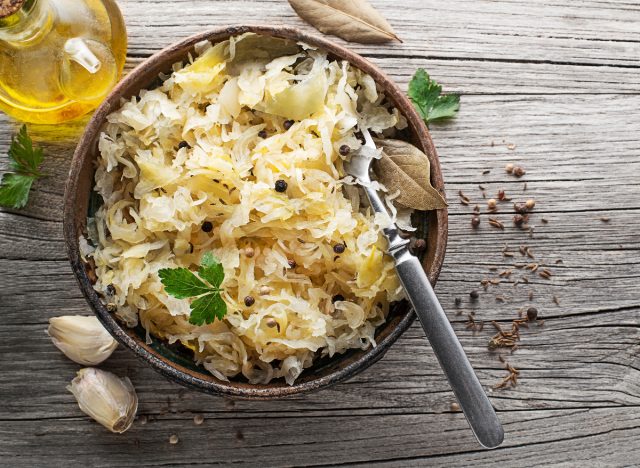
As we mentioned previously, probiotics are important for the health of your gut, which plays a role in supporting your overall health.
Because of this, incorporating fermented foods like kimchi, kefir, and sauerkraut is important because “fermented foods are great sources of probiotics,” says Greene. She adds that, “Probiotics are beneficial bacteria that support gut health, and optimizing gut health by increasing the consumption of probiotics can support your mood, digestion, energy levels, and immune function.”
If you love the taste of sauerkraut, you can enjoy it on its own, straight out of the jar. But if you’re not too sure about this fermented food, you can throw it on a salad, in a veggie bowl, or add a small amount to a sandwich.
Raspberries
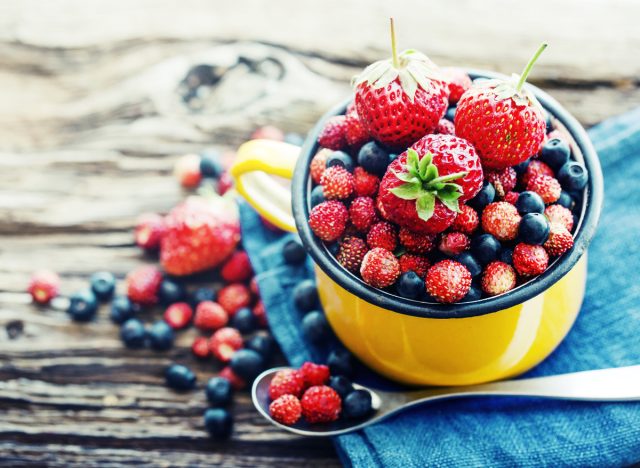
When you’re craving a sweet treat, raspberries are the perfect solution. This fruit is packed full of nutrients, and berries in general are “potent sources of polyphenols, vitamins, and minerals,” says Greene. Raspberries specifically are rich in fiber, with one cup containing eight grams of fiber, which is roughly a quarter of the recommended daily intake of fiber in one cup of fruit,” adds Greene.
Not only are raspberries full of fiber, but one cup contains over 32 milligrams of vitamin C, which is about 42% of the daily value for women and approximately 35% of the daily value for men. Getting enough vitamin C on a daily basis is important for heart health, immunity, and bone and muscle health, so throw some raspberries on top of your bowl of yogurt or oatmeal.
Pomegranate
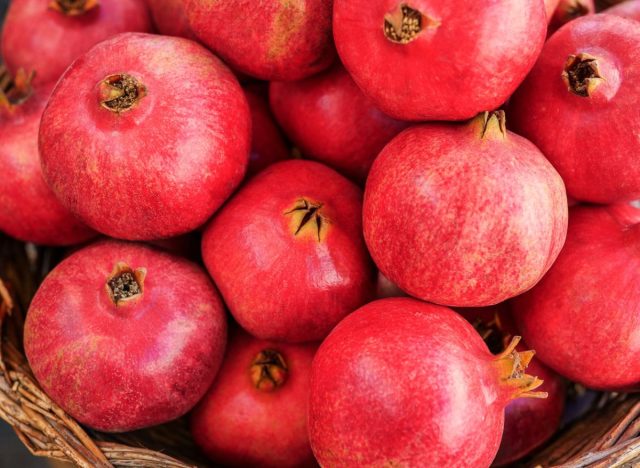
Whether you’re sipping on 100% pomegranate juice or eating a handful of arils (the seeds), this super fruit will provide a powerful boost of nutrients and antioxidants, making it one of the healthiest foods you can eat.
For one, some studies have found that pomegranate may help reduce inflammation in the body, as well as reduce your risk of heart disease and improve your overall heart health. If that weren’t reason enough, another study found that pomegranate may be able to contribute to the reduction of Alzheimer’s risk by way of reducing oxidative stress damage.
If you choose to go the juice route rather than eating the arils, just know that you’ll, unfortunately, sacrifice the fiber found in pomegranate seeds (11 grams). But if you sip on pure, 100% pomegranate juice, you can still provide your body with all the antioxidants found in the seeds as well.
True Tea
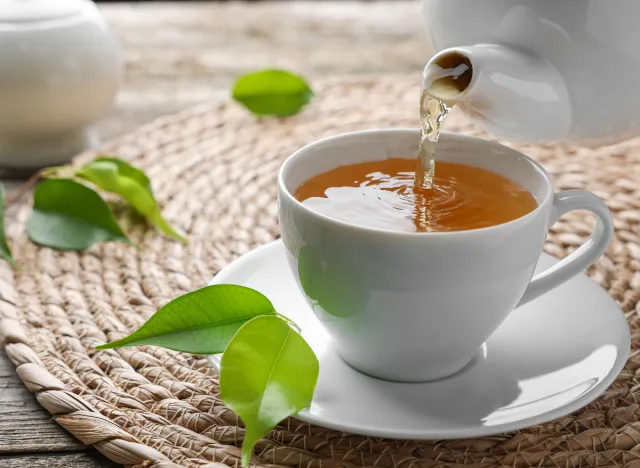
You’ve more than likely heard of the term “herbal teas,” which include options like chamomile, peppermint, red rooibos, and ginger tea. But a lesser-known label for tea is a “true tea.” According to Manaker, “There are two categories of tea—true tea and herbal tea. True tea is green tea, black tea, oolong, and white.”
“Drinking two cups of true tea supplies your body with enough of a unique plant compound called flavan-3-ols that experts recommend we consume every day,” says Manaker. “This year, the Academy of Nutrition and Dietetics released clinical guidelines suggesting that people should aim for 400-600 milligrams of flavan-3-ols every day to support heart health, and among the few items that contain flavan-3-ols, true tea tops the list when it comes to quantity.”
In fact, Manaker adds that “One 8-ounce cup of brewed green or black tea contains around 300 milligrams of flavan-3-ols, so making a habit of drinking two cups a day brings you well beyond the recommended intake.”
Garlic
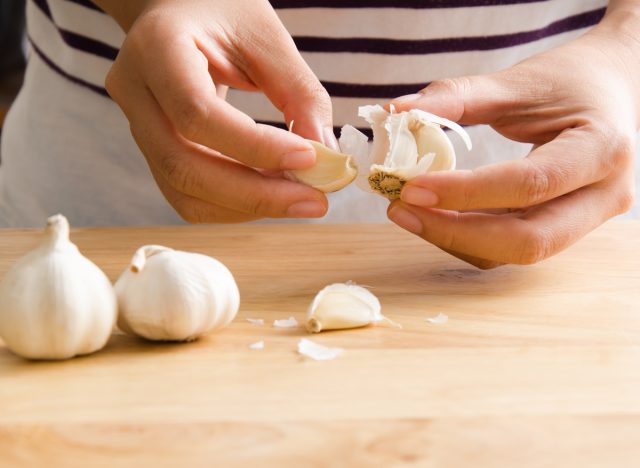
Garlic has been used for centuries to improve the health and lives of people in multiple civilizations, and today it is still used for a burst of both flavor and nutrients.
For one, this small but powerful food has been linked to better immunity, and some studies have even found that garlic supplements can help reduce the intensity and length of the common cold or flu. In addition to improved immunity, garlic supplements have also been linked to improved blood pressure levels.
Garlic supplements are more concentrated than a regular clove of garlic, but it still proves that even incorporating just a little bit of garlic into your daily life can provide your body with powerful health benefits.
Lentils
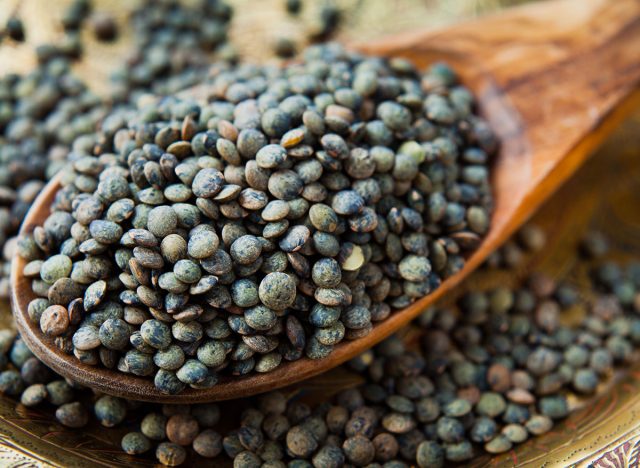
There aren’t many natural foods out there that are packed full of both fiber and protein, while also being affordable and loaded with other vitamins and nutrients. But lentils, which come in multiple varieties like brown, yellow, green, and puy, do all of that and more.
In one cup of lentils (generally speaking, as different types will differ slightly in nutritional value), you’ll get about almost 18 grams of protein and 16 grams of fiber. Adding these to any dish will not only help you maintain healthy digestion and a healthy gut microbiome because of the fiber, but the combination of fiber and protein will help keep you feeling satiated until your next meal.
Dandelion Greens
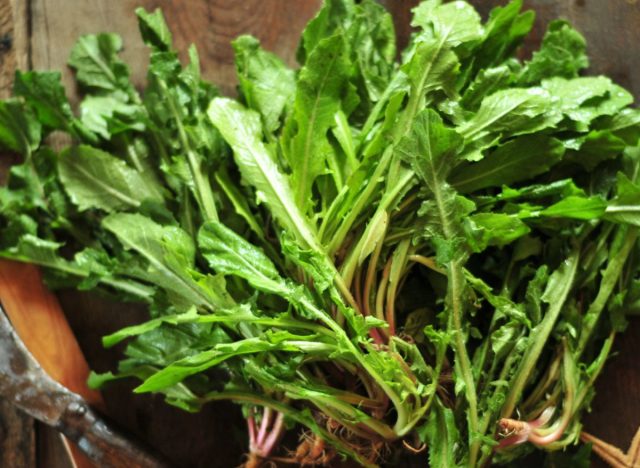
You’re familiar with greens like kale, spinach, and collards, but one type that hasn’t gained as much popularity—but should—are dandelion greens.
“Dandelion greens are powerful because they help increase bile flow, breaking down fats, easing digestion, and aiding the liver, helping to protect it and filter potentially damaging chemicals out of your food,” say the Nutrition Twins.
These greens can also contain helpful antioxidants like beta-carotene, lutein, and zeaxanthin. “Thanks to their hefty dose of lutein and zeaxanthin, dandelion greens also help to prevent cataracts and macular degeneration,” say The Nutrition Twins. “All it takes is 2 cups daily (15 milligrams of combined lutein and zeaxanthin) and you’ve well surpassed the daily requirement of 12 milligrams (10 milligrams a day for lutein and 2 milligrams a day for zeaxanthin) set by the American Optometric Association.”
Prunes
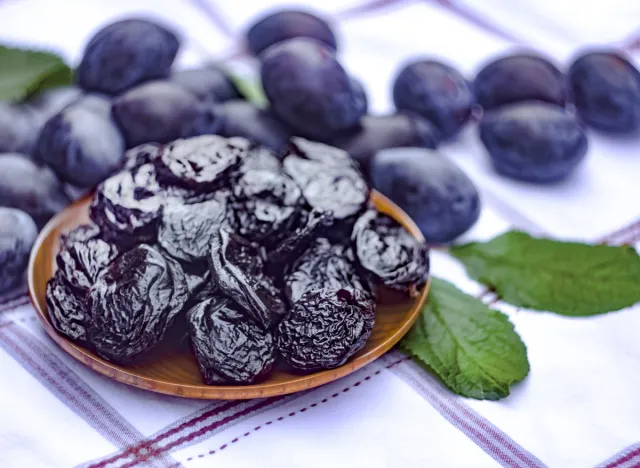
One of the healthiest foods you can eat is one that is often overlooked. And even though they’re not for everyone, prunes can pack in a ton of nutrients that your body needs.
“Prunes contain bone health-supporting nutrients, including boron, potassium, vitamin K, and plant compounds,” says Manaker, “and data shows that daily consumption of 4-6 prunes may help prevent bone loss and preserve bone structure among post-menopausal women.”
- Source: https://www.mdpi.com/2072-6643/15/2/258
- Source: https://www.nmcd-journal.com/article/S0939-4753(22)00302-7/pdf
- Source: https://www.mdpi.com/2072-6643/15/5/1099
- Source: https://fdc.nal.usda.gov/fdc-app.html#/food-details/1100559/nutrients
- Source: https://www.mayoclinic.org/drugs-supplements-vitamin-e/art-20364144#:~:text=Evidence,mild%20to%20moderate%20Alzheimer%27s%20disease.
- Source: https://pubmed.ncbi.nlm.nih.gov/19057194/
- Source: https://www.ncbi.nlm.nih.gov/pmc/articles/PMC3274736/
- Source: https://www.ncbi.nlm.nih.gov/pmc/articles/PMC3820045/
- Source: https://fdc.nal.usda.gov/fdc-app.html#/food-details/171711/nutrients
- Source: https://www.ncbi.nlm.nih.gov/pmc/articles/PMC7844610/
- Source: https://pubmed.ncbi.nlm.nih.gov/23670794/
- Source: https://pubmed.ncbi.nlm.nih.gov/23939686/
- Source: https://fdc.nal.usda.gov/fdc-app.html#/food-details/170567/nutrients
- Source: https://ift.onlinelibrary.wiley.com/doi/10.1111/1541-4337.12260
- Source: https://www.annualreviews.org/doi/10.1146/annurev.food.102308.124120
- Source: https://www.cambridge.org/core/journals/british-journal-of-nutrition/article/relationship-of-lycopene-intake-and-consumption-of-tomato-products-to-incident-cvd/56D38B7C2C9CF1D9C267CAE83AE92BFF
- Source: https://journals.sagepub.com/doi/10.1177/153537020222701003
- Source: https://fdc.nal.usda.gov/fdc-app.html#/food-details/171705/nutrients
- Source: https://www.heart.org/en/healthy-living/healthy-eating/eat-smart/fats/polyunsaturated-fats
- Source: https://pubmed.ncbi.nlm.nih.gov/23876238/
- Source: https://fdc.nal.usda.gov/fdc-app.html#/food-details/170393/nutrients
- Source: https://www.sciencedirect.com/science/article/abs/pii/S0002916523289340?via%3Dihub
- Source: https://www.cambridge.org/core/journals/british-journal-of-nutrition/article/effects-of-the-fibre-content-and-physical-structure-of-carrots-on-satiety-and-subsequent-intakes-when-eaten-as-part-of-a-mixed-meal/51C9A6ABC36C12FA9B5ECC2A6EC4AD55
- Source: https://www.mdpi.com/2072-6643/14/15/3002
- Source: https://fdc.nal.usda.gov/fdc-app.html#/food-details/170184/nutrients
- Source: https://fdc.nal.usda.gov/fdc-app.html#/food-details/171496/nutrients
- Source: https://fdc.nal.usda.gov/fdc-app.html#/food-details/168314/nutrients
- Source: https://www.mayoclinic.org/healthy-lifestyle/nutrition-and-healthy-eating/in-depth/fiber/art-20043983
- Source: https://fdc.nal.usda.gov/fdc-app.html#/food-details/173735/nutrients
- Source: https://www.health.harvard.edu/blog/should-i-be-eating-more-fiber-2019022115927#:~:text=On%20average%2C%20American%20adults%20eat,and%2038%20grams%20for%20men.
- Source: https://www.health.harvard.edu/staying-healthy/how-to-get-more-fiber-in-your-diet
- Source: https://fdc.nal.usda.gov/fdc-app.html#/food-details/168462/nutrients
- Source: https://pubmed.ncbi.nlm.nih.gov/19168000/
- Source: https://pubmed.ncbi.nlm.nih.gov/22019438/
- Source: https://fdc.nal.usda.gov/fdc-app.html#/food-details/168421/nutrients
- Source: https://fdc.nal.usda.gov/fdc-app.html#/food-details/170557/nutrients
- Source: https://www.ncbi.nlm.nih.gov/pmc/articles/PMC7352515/
- Source: https://pubmed.ncbi.nlm.nih.gov/27683874/
- Source: https://pubmed.ncbi.nlm.nih.gov/28824916/
- Source: https://www.ncbi.nlm.nih.gov/pmc/articles/PMC4432495/
- Source: https://fdc.nal.usda.gov/fdc-app.html#/food-details/167755/nutrients
- Source: https://ods.od.nih.gov/factsheets/VitaminC-Consumer/
- Source: http://www.eurekaselect.com/article/99473
- Source: https://pubmed.ncbi.nlm.nih.gov/28608832/
- Source: https://pubmed.ncbi.nlm.nih.gov/26559394/
- Source: https://academic.oup.com/advances/article/13/6/2070/6747118
- Source: https://pubmed.ncbi.nlm.nih.gov/22280901/
- Source: https://pubmed.ncbi.nlm.nih.gov/19060427/
- Source: https://fdc.nal.usda.gov/fdc-app.html#/food-details/172421/nutrients
- Source: https://fdc.nal.usda.gov/fdc-app.html#/food-details/169226/nutrients
- Source: https://www.aoa.org/news/clinical-eye-care/health-and-wellness/healthy-eyes-recipe-eye-friendly-nutrients?sso=y
- Source: https://www.sciencedirect.com/science/article/abs/pii/S2161831323000236?via%3Dihub









